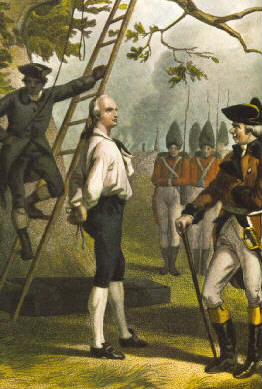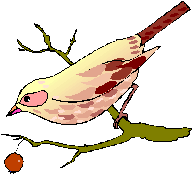

That man is a diamond...last but not least a Christian. man speaking of his friend Nathan Hale

Nathan Hale, born 1755 in Connecticut, grew up in a Christian home. His father was deacon in the local Congregational church and his brother was studying to become a pastor.
At Yale, not only was he known for his athletic strength and ability, he also was very studious, having learned large portions of scripture by heart. By the time he became a young teacher, there was talk of England and war; and in the summer of 1775, Nathan joined with the patriots in standing up for our rights.
He was commissioned as an officer in the Connecticut militia, served in the siege of Boston, then went away to New York operations. During his service, Nathan had acted with great kindness toward his men. For example, to help their sinking morale, he divided his extra pay amongst them. When any of them became ill, he was sure to visit each and pray with them.
Nathan Hale believed the Brits were going against our Creator's natural order of laws. His beliefs were so bold, he was willing to die for his country and its rights under God. He volunteered in a dangerous mission to disguise himself and get information about the British forces on Long Island.
On September 22, 1776, a British officer appeared in the American camp under a flag of truce. Dressed in farm clothes and carrying his Yale diploma, Hale let the British think he was a Dutchman seeking to become a teacher. Taking notes in Latin, he was able to examine every part of the British army and obtain information in regard to their current situation and future plans. Just a mile and a half from safety, he was discovered and captured. With evidence so plain, he immediately acknowledged who he was
Put in jail, he was told he would be executed in the morning. Nathan asked to see a chaplain, but his request was denied. He asked for a Bible, but that request was also denied. He wrote a couple of letters to family and a close friend, but they were destroyed.

“The order was accordingly executed in the most unfeeling manner, and by as great a savage as ever disgraced humanity. A clergyman, whose attendance he desired, was refused him; a Bible, for a few moments' devotion, was not procured, although he wished it. Letters which, on the morning of his execution, he wrote to his mother and other friends, were destroyed; and this very extraordinary reason given by the provost-martial, "That the rebels should not know they had a man in their army who could die with so much firmness."
Unknown to all around him, without a single friend to offer him the least consolation, thus fell as amiable and as worthy a young man as America could boast, with this as his dying observation, that "he only lamented that he had but one life to lose for his country,"
For I am persuaded, that neither death, nor life, nor angels, nor principalities, nor powers, nor things present, nor things to come, Nor height, nor depth, nor any other creature, shall be able to separate us from the love of God, which is in Christ Jesus our Lord. Romans 8:38-39
John Frost,
1848, Lives of the Heroes of the American
Revolution: Comprising the Lives of Washington and His Generals and Officers Who
Were the Most Distinguished in the War of the Independence of the U. S. A.; Also
Embracing the Declaration of Independence and Signers'... See
biography by H. P. Johnston (1914); Morton Pennypacker, General Washington's
Spies on Long Island and in New York, 1939.
See Hale Roots:
http://members.aol.com/haleroots/nathanhale.html
http://en.wikipedia.org/wiki/Nathan_Hale
http://chi.gospelcom.net/lives_events/more/hale.shtml
http://www.americanrevolution.com/ppl_nathan_hale.html
Seymour, George Dudley.Documentary Life of Nathan Hale. New Haven, CT, 1941.
Katz, Joyce. One Life to Lose; the story of Nathan Hale.
Antiquarian and Landmark's Society, Inc. of Connecticut, 1977.
photos above from
http://www.americanrevolution.com/NathanHale.htm


The breezes went steadily through the tall pines,
A-saying "oh! hu-ush!" a-saying "oh! hu-ush!"
As stilly stole by a bold legion of horse,
For Hale in the bush, for Hale in the bush.
"Keep still!" said the thrush, as she nestled her young
In a nest by the road; in a nest by the road.
"For the tyrants are near, and with them appear
What bodes us no good, what bodes us no good."
The brave captain heard it, and thought of his home
In a cot by the brook; in a cot by the brook.
With mother and sister and memories dear,
He so gaily forsook, he so gaily forsook.
Cooling shades of the night were coming apace,
The tattoo had beat, the tattoo had beat;
The noble one sprang from his dark lurking place,
To make his retreat, to make his retreat.
He warily trod on the dry rustling leaves,
As he passed through the wood, as he passed through the wood;
And silently gained his rude launch on the shore,
As she played with the flood, as she played with the flood.
The guards of the camp on that dark dreary night,
Had a murderous will, had a murderous will;
They took him and bore him after from the shore,
To a hut on the hill, to a hut on the hill.
No mother was there, nor a friend who could cheer,
In that little stone cell, in that little stone cell;
But he trusted in love from his Father above --
In his heart all was well, in his heart all was well.
An ominous owl with his solemn bass voice,
Sat moaning hard by, sat moaning hard by:
"The tyrant's proud minions most gladly rejoice,
For he must soon die, for he must soon die."
The brave fellow told them, no thing he restrained,--
The cruel general! the cruel general!--
His errand from camp, of the ends to be gained,
And said that was all, and said that was all.
They took him and bound him and bore him away,
Down the hill's grassy side, down the hill's grassy side.
'T was there the base hirelings, in royal array,
His cause did deride, his cause did deride.
Five minutes were given, short moments, no more,
For him to repent, for him to repent.
He prayed for his mother -- he asked not another, --
To Heaven he went, to Heaven he went.
The faith of a martyr the tragedy showed,
As he trod the last stage, as he trod the last stage.
And Britons will shudder at gallant Hale's blood,
As his words do presage, as his words do presage.
"Thou pale king of terrors, thou life's gloomy foe,
Go frighten the slave, go frighten the slave;
Tell tyrants, to you their allegiance they owe--
No fears for the brave, no fears for the brave!"